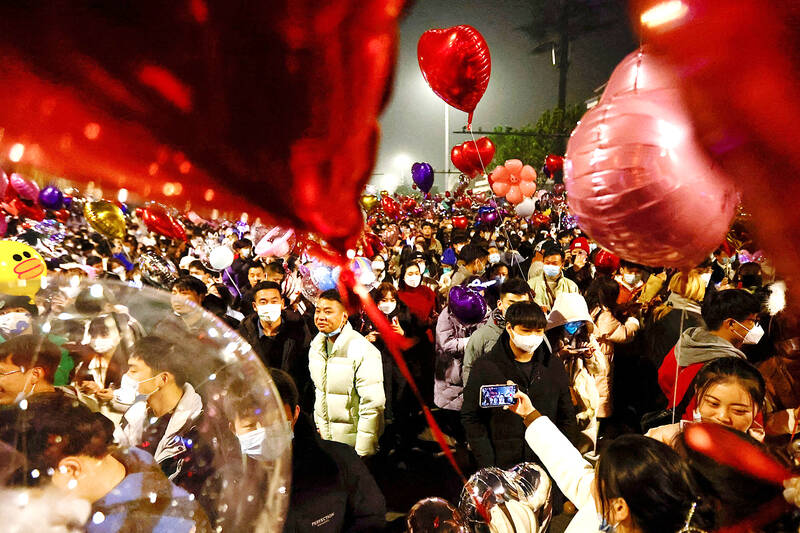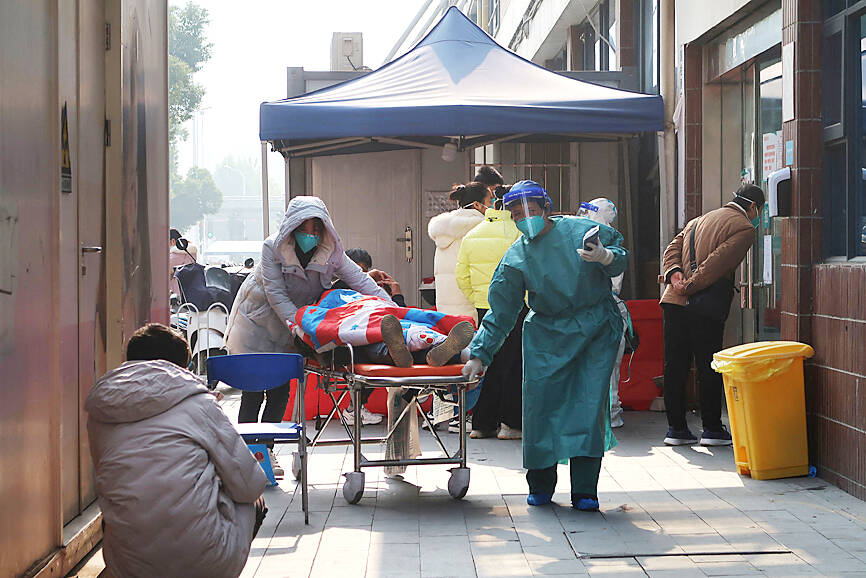Thousands gathered in central Wuhan, China, on Saturday night to count down to the start of what many hoped would be a much better year after a “tough” last year filled with lockdowns and a major new outbreak of COVID-19 last month.
Many released balloons into the sky when the clocks struck midnight, as per tradition in the central Chinese city, where the COVID-19 pandemic began three years ago, before taking selfies with their friends.
“In the past year, I feel that COVID-19 was very serious and some of my family members have been hospitalized,” a 17-year-old high-school student surnamed Wang told reporters shortly after midnight. “I hope they will be healthy in the new year. This is the most important thing.”

Photo: Reuters
Some came in fancy dress and almost everyone present wore masks as the country sees a wave of COVID-19, which accelerated after curbs were dropped and which has since infected large swathes of the population, with deaths reaching an estimated 9,000 a day, according to UK-based health data firm Airfinity.
“I am afraid,” a woman surnamed Jin said, referring to the possibility of being reinfected with COVID-19. “I was still afraid when I came out tonight, but I just wanted to come out, because everyone has come out.”
The crowds, including Jin, who were especially tightly packed in front of the old clock tower at Wuhan’s Hankou Customs House, were watched by large numbers of police officers, SWAT teams, unidentified plain-clothed personnel and other security workers.

Photo: Reuters
In late November last year, hundreds of people took part in lockdown demonstrations on the streets of cities across the country, including Wuhan. Following those protests, China abandoned its strict “zero COVID-19” policy of stringent curbs.
“Those restrictions were in place for too long, so perhaps people were pretty unhappy,” a 24-year-old Wuhan-based e-commerce worker surnamed Chen said. “It had been a long time since things were lively and vibrant.”
Police used loudspeakers at a number of locations, blasting out a short message on a loop telling people not to gather, to which people appeared to take little or no notice.
People just wanted to have a nice time.
“I’m looking forward to the new year, but I’m also very nervous,” said Wuhan resident Lily Zhao, 37, who works as a kindergarten teacher. “I’m wondering when this epidemic will be completely over.“
A long line of people formed at the emergency department of Wuhan’s Tongji Hospital, a major facility for COVID-19 patients, such as a 72-year-old man surnamed Huang.
“I don’t feel well. I have no energy. I can’t breathe. I used to be in good health. I had X-rays to check my lungs... This hospital is a lot of trouble, you have to wait a long time,” he said.
the country’s abrupt U-turn on COVID-19 controls — as well as the accuracy of its case and mortality data — have come under increasing scrutiny at home and overseas.
The surge in cases has raised fresh worries about the health of the economy.
In his first public comments since the change in policy, Chinese President Xi Jinping (習近平) in a New Year’s address called for more effort and unity as China enters a “new phase.”
China reported one new COVID-19 death on Saturday, the same as a day earlier, the Chinese Center for Disease Control and Prevention said yesterday.
The accumulated official death toll in China now stands at 5,249, far lower than in other large countries. The Chinese government has rejected claims that it has deliberately underreported the total number of fatalities.
At the Hankou funeral home on the outskirts of Wuhan, an intermittent stream of mourners and hearse drivers were arriving yesterday.
Staff at the site’s heavily guarded entrance declined to answer questions about their recent workloads, but funeral homes in other cities in China — including Chengdu and Beijing — said they were busier than ever since China abruptly ditched its COVID-19 curbs.
In Shanghai, which like many Chinese cities was put under a lengthy lockdown last year, many on Saturday thronged the historic riverside walkway, the Bund.
“We’ve all traveled in from Chengdu to celebrate in Shanghai,” said Da Dai, a 28-year-old digital media executive who was traveling with two friends. “We’ve already had COVID, so now feel it’s safe to enjoy ourselves.”
While there were enough people on the Bund to warrant police directing the flow of those there, local eateries were less busy than in 2021.
“It’s not nearly as busy as it was last year,” said a waiter at the Lost Heaven restaurant close to the Bund.
Some tables were empty, which would not normally be the case on New Year’s Eve, he said, declining to be named as he was not authorized to speak to the media.
The restaurant had more than 200 bookings, but typically has 20 to 30 percent more, he said.
“People have been afraid to come out since the COVID policy was loosened,” he said. “Hopefully it’ll be better next year.”

POLITICAL PRISONERS VS DEPORTEES: Venezuela’s prosecutor’s office slammed the call by El Salvador’s leader, accusing him of crimes against humanity Salvadoran President Nayib Bukele on Sunday proposed carrying out a prisoner swap with Venezuela, suggesting he would exchange Venezuelan deportees from the US his government has kept imprisoned for what he called “political prisoners” in Venezuela. In a post on X, directed at Venezuelan President Nicolas Maduro, Bukele listed off a number of family members of high-level opposition figures in Venezuela, journalists and activists detained during the South American government’s electoral crackdown last year. “The only reason they are imprisoned is for having opposed you and your electoral fraud,” he wrote to Maduro. “However, I want to propose a humanitarian agreement that

ECONOMIC WORRIES: The ruling PAP faces voters amid concerns that the city-state faces the possibility of a recession and job losses amid Washington’s tariffs Singapore yesterday finalized contestants for its general election on Saturday next week, with the ruling People’s Action Party (PAP) fielding 32 new candidates in the biggest refresh of the party that has ruled the city-state since independence in 1965. The move follows a pledge by Singaporean Prime Minister Lawrence Wong (黃循財), who took office last year and assumed the PAP leadership, to “bring in new blood, new ideas and new energy” to steer the country of 6 million people. His latest shake-up beats that of predecessors Lee Hsien Loong (李顯龍) and Goh Chok Tong (吳作棟), who replaced 24 and 11 politicians respectively

Young women standing idly around a park in Tokyo’s west suggest that a giant statue of Godzilla is not the only attraction for a record number of foreign tourists. Their faces lit by the cold glow of their phones, the women lining Okubo Park are evidence that sex tourism has developed as a dark flipside to the bustling Kabukicho nightlife district. Increasing numbers of foreign men are flocking to the area after seeing videos on social media. One of the women said that the area near Kabukicho, where Godzilla rumbles and belches smoke atop a cinema, has become a “real

‘WATER WARFARE’: A Pakistani official called India’s suspension of a 65-year-old treaty on the sharing of waters from the Indus River ‘a cowardly, illegal move’ Pakistan yesterday canceled visas for Indian nationals, closed its airspace for all Indian-owned or operated airlines, and suspended all trade with India, including to and from any third country. The retaliatory measures follow India’s decision to suspend visas for Pakistani nationals in the aftermath of a deadly attack by shooters in Kashmir that killed 26 people, mostly tourists. The rare attack on civilians shocked and outraged India and prompted calls for action against their country’s archenemy, Pakistan. New Delhi did not publicly produce evidence connecting the attack to its neighbor, but said it had “cross-border” links to Pakistan. Pakistan denied any connection to